
Guests
- Volker TürkUnited Nations high commissioner for human rights.
Democracy Now! recently interviewed U.N. High Commissioner for Human Rights Volker Türk in Geneva, Switzerland. The wide-ranging conversation touched on immigration policy in the United States, climate change around the world, the global fight to preserve human rights and more.
See Part 1 of our conversation with Türk, including his response to Israel’s brutal war on Gaza.
Transcript
AMY GOODMAN: This is Democracy Now!, democracynow.org. I’m Amy Goodman.
We end today’s show with U.N. High Commissioner for Human Rights Volker Türk. I spoke to him last week when I went to Geneva, Switzerland. We were speaking in the U.N. Human Rights Council. In Part 1 of our conversation, we talked about Israel’s war on Gaza. Now we turn to Part 2. We talked about immigration policy in the U.S., climate change and more. I started by asking the U.N. high commissioner about the changing role of the U.S. in the world.
AMY GOODMAN: So, Volker Türk, let’s talk about the role of the United States, the most powerful country on Earth. In March, you expressed deep concern about a fundamental shift in direction in the United States under President Trump. Can you elaborate?
VOLKER TÜRK: Look, I have been very worried about what happens on the deportations and the treatment of migrants, for example. And I’ve been worried about it because I see also the vilification of migrants and refugees in the public debate. There is — I was living — I lived in New York during COVID. I was every day grateful for the migrant workers that kept the city going, in terms of making sure that the garbage is collected, that we get our food. I was actually at some stage wondering: If they didn’t work for — if they didn’t work, what would happen to all of us? We might actually starve. And now I see the vilification of migrant workers. I see a debate that reminds me of times that we thought we had all overcome.
And yes, that worries me, because it polarizes and divides the society, and it pits one group against the other. And that’s not what I know the United States to be. The United States, for me, is a country that helped resettle refugees who were extremely vulnerable, who were persecuted. I remember when, in previous times, the highest number of refugees that came from war-torn countries were accepted and hosted in the United States. And I wish that this part of the United States comes out much more strongly, in an environment that, frankly, is so divided.
AMY GOODMAN: So, let’s talk about CECOT for a minute. In May, you expressed alarm over the Trump administration’s use of a Salvadoran mega-prison to detain immigrants without due process, potentially for life. Your office has received information from family members and lawyers regarding more than a hundred Venezuelans believed to be held at CECOT. Can you talk about the men who have been shipped to this mega-prison?
VOLKER TÜRK: So, we were in touch with family members who didn’t know where their loved ones were, which, for us, of course, always raises the alarm bells when it comes to: Are they missing? Are they disappeared? What happened to them? And it is an obligation of the state, when you engage in deportations, to inform, you know, to provide information. And frankly, the fact that it went to a third country and not to the country of origin, after due process — because due process always has to be guaranteed — is a huge worry and a huge concern. We don’t have — I wrote to the president of El Salvador about the conditions. We don’t have access there.
AMY GOODMAN: President Bukele, who called himself “the coolest dictator in the world.”
VOLKER TÜRK: Well, we wrote to him, and we have engaged with the El Salvadorian authorities, because, of course, there are human rights concerns that are attached to what’s happening. And we just — we have not been able to have access. So —
AMY GOODMAN: Has he responded?
VOLKER TÜRK: No, he has not, which happens sometimes. But at the same time, as you know, including in the council that you see behind you, the council is also for us the place where we can put issues and situations into the spotlight of international attention. So, for us, it’s also very important, when we don’t get the cooperation that we need, to actually mention it then in the public arena.
AMY GOODMAN: And he hasn’t let you into that prison?
VOLKER TÜRK: We have not had access since that — since that period.
AMY GOODMAN: Talking about immigration and what’s happening to immigrants in the United States, you urged U.S. authorities earlier this month to respect the right to peaceful assembly and refrain from using military force in the context of the huge protests around Trump’s policies. Your reaction to Trump overriding California’s governor, deciding to send in the, first, National Guard, then the Marines, to crack down on the protests?
VOLKER TÜRK: Well, I made it absolutely clear before the council that any militarized response to the freedom of peaceful assembly is absolutely not warranted when indeed you have peaceful assembly. That’s a fundamental freedom. So, I hope that it will come to a rethink of this type of approaches in the future, because we know what it means when you militarize responses to, essentially, law enforcement issues. But there is always the fundamental right of freedom of expression, of peaceful assembly, of solidarity with people who are vulnerable, and that needs to be respected.
AMY GOODMAN: You once quoted the 20th-century philosopher Antonio Gramsci, imprisoned by the Italian fascist Mussolini for 12 years ’til his death. You were making a comparison between fascism in Europe during early 20th century and the surge of populism and nationalism and xenophobia today. You quoted Gramsci saying, “The old world is dying, and the new world struggles to be born: Now is the time of monsters.” Who are the monsters today?
VOLKER TÜRK: The monsters today are the lack of solidarity and empathy and compassion that we see, unfortunately, reign, not just in North America, but also in Europe, in other parts of the world. I mean, I just came from Sri Lanka, just to give you an example. After 16 years of when the war ended in a brutal way, I still see the ghosts of the past haunting the present. And it’s as a result of fundamental divisions and polarizations and prejudice and racism that we saw what happened in the past.
And I do think that the monsters of today is the absence of a public space where you can have a proper discussion, where you can agree to disagree, but you actually have a debate about challenges. What I see is people getting warped into their own bubbles, their echo chambers, not listening to the other anymore and not understanding the grievances that exist and trying to find a solution to it. So, for me, it’s actually politics that has become quite tone-deaf to the real concerns that people have. And that that worries me a lot, because it — the absence of a public space means the absence of compromise, the absence of finding a solution, the absence of debating and disagreeing or agreeing and, you know, fighting it out, but in a constructive way that actually leads to solutions.
AMY GOODMAN: There’s just a piece in The Washington Post about the cutting of USAID funding in the world. And it said, “Children clung to life in Sudan by the slenderest of threads, supported by community soup kitchens. Then the USAID funding cuts came, and their mothers watched them starve to death one by one.” Can you talk about the effects of this drastic cut, the ending, essentially, of USAID in the world, programs that had been established for years, and also the cuts to the United Nations and the effects that that has had, those cuts by the United States by President Trump?
VOLKER TÜRK: So, it is extremely, extremely unfortunate that USAID is no longer there in the way that we know it, because USAID provided immediate relief to millions of people. It made sure that human rights NGOs at the grassroots level, for example — I’ve met many of them — are running out of funding and may no longer be able to be the fighters for freedom and justice. It means that, as you just mentioned, in many conflict situations around the world, we simply will not be able to provide the humanitarian assistance that is required. And that means real — again, real-life consequences. People will die. People will end up in extremely vulnerable situations. And it will lead to more — potentially, more conflict. I mean, what the U.S. generously has done for decades has been its soft power. It has also influenced things in a positive way. Now that’s gone. And yes, I’m worried about it.
The same with the United Nations. I mean, the fact that some of the massive funding, my own organization, we are not getting — our funding was cut, which means that we will not be able to continue doing the monitoring and the reporting and the documenting and the intervening and being the bridge between civil society and the institutions of the state. For example, in Colombia, we have to cut our operation by half. And that has — again, we are an important part of the peace process. It means that this will suffer. And yes, these are the real-life consequences of such decisions, which I regret very much.
AMY GOODMAN: I just watched you give an opening address here at the U.N. Human Rights Council. You were talking about climate change. We at Democracy Now! have attended the U.N. climate summits, from Copenhagen in 2009 on to what will be on the edge of the rainforest, the Brazil U.N. human — the U.N. climate summit. We also just came here from New York. We were experiencing a major heat dome in New York., came to Geneva. You’re experiencing here the same thing, extreme weather raging across the globe, the Financial Times reporting Sunday, quote, “Temperatures reached dangerous highs as 'heat domes' hit Europe and US.” Volker Türk, you’ve called for states, corporations to be held to account, including for damage to our climate and environment. Can you relate the climate catastrophe that we are experiencing to immigration, to the crises that we’re experiencing around the world with that, to poverty, to Indigenous rights, and who is responsible?
VOLKER TÜRK: So, the climate crisis is absolutely a human rights crisis. There’s no doubt about it. And one of the big collateral damages of the wars that we see today is actually that there is less focus on the big challenges of our time, such as climate change. I mean, a couple of years ago, I remember, when I came to New York in 2019, there were young, young people on the streets. Everyone was protesting and, you know, activating, Fridays for Future. There were all these movements about making sure that climate change and climate action is addressed properly. Today, you don’t see it in the same way, and despite the fact that we already live the consequences. I mean, the heat dome over the Europe, I mean, we’ve decided not to wear ties anymore as a result.
But it shows, when it also affects us, what does it mean for Indigenous peoples? What does it mean for the most vulnerable? What does it mean for a woman who has six children in the Sahel, how she’s going to survive? And yes, people will probably have to leave behind their livelihoods. And what will happen, you will see massive internal migration in the countries in the climate hot spots around the world. I don’t think we should ever go into this that they will all come to Europe or the United States. They won’t. They will try to survive in their own countries, but under abominable circumstances. So, yes, the climate emergency is one of the big, big challenges of our time, and I hope that politicians refocus on it and spend their political capital and their political energy on trying to resolve it. And we have the solutions to it.
AMY GOODMAN: Your response to President Trump? Basically, his mantra is “Drill, baby, drill.”
VOLKER TÜRK: Well, renew energy, renew energy, renew energy. And let’s get into a much better world. I mean, we know that the fossil fuel is not going to be the future. That’s long the — that’s the past, and even behind the past. So, we absolutely need a rethink of all of these things.
AMY GOODMAN: Just outside the U.N. Human Rights Council, right outside the main door, in the hallway, the council has agreed to the Sahrawi women building a jaima, a tent, that is so familiar to the Indigenous people of Western Sahara. They have fought for decades to organize a U.N.-backed referendum on independence. Volker Türk, I saw you a few years ago. You reiterated the right to self-determination when addressing the Sahrawi issue, calling for placing human rights at the heart of the issue. What’s been the Security Council, the U.N. General Assembly’s decisions regarding the issue of Western Sahara?
VOLKER TÜRK: Basically, we have decisions taken by the Security Council that have not been implemented. That’s the fact of the matter. And I, myself —
AMY GOODMAN: Occupied by Morocco since 1975.
VOLKER TÜRK: Exact. So, we have — and that’s, again, one of those long, protracted situations where we haven’t seen a resolution. On the human rights front, I’ve asked to send a mission there, but, unfortunately, I have not been successful in this.
AMY GOODMAN: U.N. High Commissioner for Human Rights Volker Türk. To see the full interview, including his remarks on Gaza, go to democracynow.org. We were speaking in Geneva, Switzerland. I’m Amy Goodman.

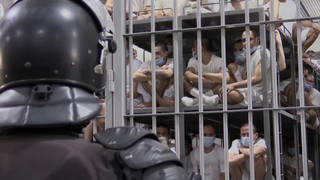
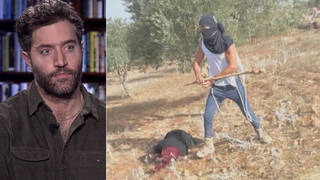
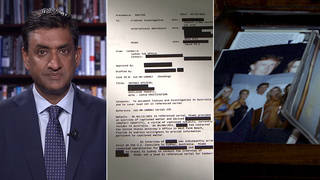
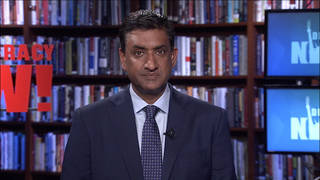
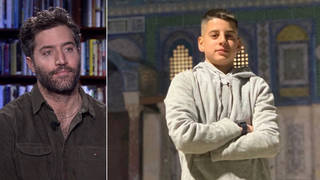





Media Options